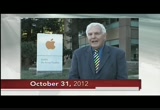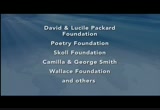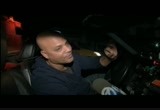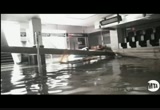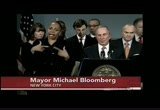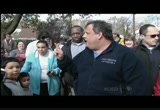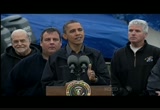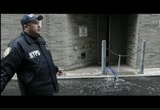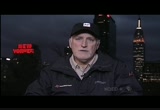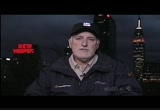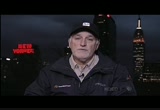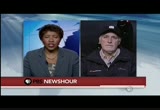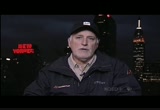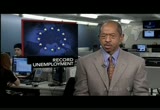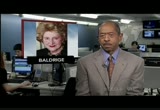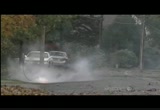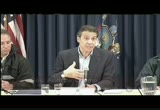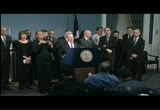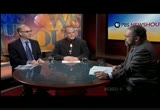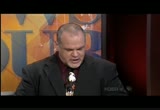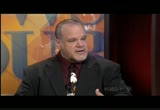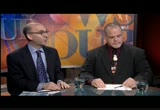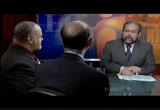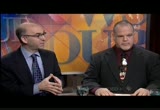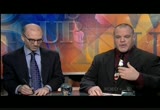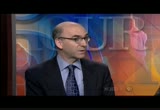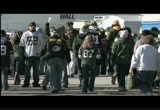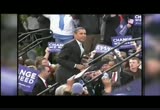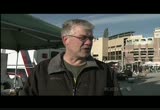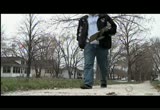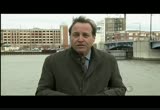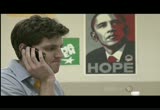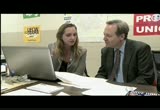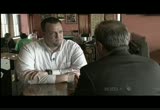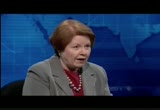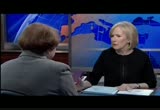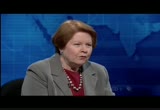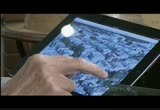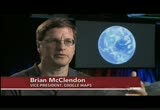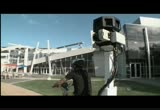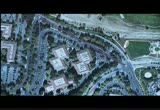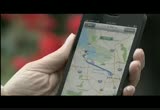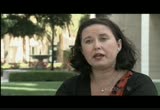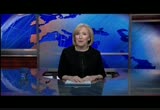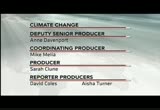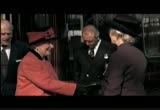tv PBS News Hour PBS November 1, 2012 12:00am-1:00am PDT
12:00 am
captioning sponsored by macneil/lehrer productions >> ifill: the northeast struggled to get back on its feet today, even as millions remained without power and bright sshine revealed the staggering damage.ht good evening, i'm gwen ifill. >> woodruff: and i'm judy woodruff. on the "newshour" tonight, we update the aftermath of sandy as president obama gets a first hand look at the devastation along new jersey's shoreline. >> ifill: then, how do you plan for increasingly common super storms? ray suarez examines th as part of aour series: ouping with climate citnge. >> woodruff: jeffrey brown reports on the battle of the ground game, hard fought on wisconsin's turf.
12:01 am
>> who knew? it turns out that green bay iste one of the most swinging cities in the whole country, politically speaking, that is. we'll explain. >> ifill: the supreme court devoted its day to drusniffing dogs and privacy rights. we talk with marcia coyle of the dtional law journal. >> woodruff: and spencer michels looks at the complaints about apple's maps and the high stakes for those trying to come up with something better. >> the battle over digital map making indicates how crucial this field has become and it could bode well for consumers as the maps get better. >> ifill: that's all ahead on tonight's "newshour." major funding or the pbs newshour has been provided by: di ♪ ♪
12:02 am
moving our economy for 160 years. bnsf, the engine that connects us. and with the ongoing support of these institutions and foundations. and... this program was made possible by the corporation for public broadcasting. and by contributions to your pbs station from viewers like you. thank you. io >> woodruff: the u.s. death toll from the giant storm named sandy has risen to at least 63 today.
12:03 am
about 6.5 million homes and businesses are still without electricity though there were signs of daily life returning to its usual rhythm in some ples. a familiar sound returned to lower manhattan streets last night. ( horns honking ) the power did not. police helped direct traffic with signals still dark, but one taxi driver said it wasn't worth the risk. >> it's been dangerous. i've got to go home, i'll walk. there's no traffic signal light, no nothing there. >> woodruff: you're going home? you're done? >> i'm done already. >> woodruff: it wasn't much easier for pedestrians who made their way on foot, some with only flashlights leading the way. >> it's really unsettling because we don't have power. we don't know what's going on. we don't have anywhere to get to televisions. >> woodruff: many people flocked to mobile charging stations across the city. plugging in cell phones and other devices. but today brought s e sign of things slowly returning to
12:04 am
normal in the big apple. this morning, mayor michael bloomberg rang the opening bell on wall street where activity returned to the trading floor.ht commuters crowded near bus stops with routes now up and running. others walked across city bridges alongside cars snarled in traffic jams. some broadway shows returned to2 the stage well.l. c2e su systereins closed, as crews worto clear stations that remain floodedc2 a t new york governor andrew cuomo said is being prioritized. >> getting the water out of the tunnels is probably the main, one of the main orders of business right now. these are significant challenes that we're facing and problems, in many cases, that we've never2 experieed before or not ic2 generion. >> woruffcuomo anced limited subway service will start thursday morning. flooding pt laguardia airport closed.ua
12:05 am
j.f.k. and newark airports have resumed some trav l. and high waters led to a number of rooftop rescues ol.trappedes residents yesterday in staten island. late today, new york city mayor michael bloomberg said most bridges and tunnels will be restricted to high-occupancy vehicles for next several days. but he said his city is on the road to recovery. >> bottom line is we've lost some people and pray for families. go forward here and keep this city going and make sure we have visitors and jobs for people. do that in the names we lost. thank you very much. >> reporter: in new jersey, aerial views from helicopters revealed scenes of total devastation. entire neighborhoods underwater in ocean county, an amusement
12:06 am
park along the jersey shore in seaside heights in disarray, with some rides washed away by the waves.se those displaced by the storm have been taking shelter in gymnasiums and other facilities. >> we never went trough anything like this. we may have had a storm where it blew a couple of things back and forth, but for it to be flooded lace,all over the disheveled. >> i'm 69 years old and it's worse i've ever seen in my life. >> halloween will be on monday in new jersey, all right. >> reporter: today, new jersey governor chris christie met with residents in sayreville. many he spoke to were in tears. >> i've got nothing left, our memories and everything else, everything's ruined, ruined. >> i know that. it's going to be okay. >> i'm devastated over this, i'm devastated. >> i wanted to come see sayreville today before i see the present this afternoon. i want him to understand that it's not just the jersey shore that's been devastated, but other parts of our state as well that were damaged pr the storm surge. t can't be everywhere obviously across the state today.
12:07 am
>> woodruff: a short time later, governor christie greeted president obama and federal emergency management agency head craig fugate in atlantic city. the trio toured the storm damage along the coas >> we're gng to have a lot of work to do.ng i don't want anybody to feel that somew this is all going to get cleaned up overnight. we want to make sure that people have realistic expectations. but what i can promise you is that the federal government will be woing as closely as possible with the state and local w officials and we will nt quit until this isone. and the directive i have given-- and i said this yesterday but i will repeat and i think craig and others o are working with me right now know i mean it-- wo are not going to tolerate red tape, we're not going tod tolerate bureaucrac >> woodruff: meanwhile, republican mitt romney returned to the campaign trail today with three events in florida. the g.o.p. presidential nominee also mentioned the ongoing recovery in the northeast.
12:08 am
>> this is... this is quite a time for the country, as you know. we're... we're going through trauma in a major part of the country, a kind of trauma you've experienced here in florida more than once. and... and it's interesting to see how people come together in a circumstance like this. we've seen folks from all over the country step forward and... and offer contributions. >> woodruff: bumps in the recovery were evident in new y late today, where the public, bellevue hospital , started evacuating about 500rk patients because of deteriorating conditions. >> ifill: and for more on fill a short time ago governor cuomo said laguardia area will open for flights tomorrow morning. today's developments, we're joined again tonight by warren levinson of the associated press. he's been making his way around new york city today, and is just back from a trip to the evacuated bellevue hospital.
12:09 am
warren, what do we know about why they decided to send patients away? >> well, we're not getting a lot of information from the hospital, gwen, but essentially what happened is just like new york university hospital up the road from them, they lost power when the storm hit, they had emergency generators, more of their emergency generators than n.y.u. hospital were woing so they were able to maintain power. but when they took ao really had look what's doing in the basement they realizedded we've got 17 million gallons of sea water in here and these generators are not going to hold up. so discretion being the better part of valor, they're moving patients. it's a massive undertaking and probably won't be done for a day or so, nearly 500 patients who have to go. they were, as the storm was approaching, diverting patients to other hospitals but it's a laborious process to find a bed for somebody and then get that person into an ambulance and move them out startingith the sickest. >> ifill: 17 million gallons of sea wier sounds amazing, actually. i want to ask you about two other things that mayor bloomberg talked about today in his briefings.
12:10 am
one is that if you want to get in a car and a drive into manhattan tomorrow there are now limitations. what are those limitations? >> the limitations are that starting at 6:00 in the morning it's three people per vehicle. epparently police will be there keeping you from getting into the city, getting into manhattan. if you try, they'll pull you over, won't let you and all the other drivers will wizan by. that's mainly it. what we saw today was an increase in traffic as people wanting to get back to some sense of normality getting around because we still don't have subways, we do have buses but the buses tha i saw today were really, really packed and mainly sitting in traffic. >> ifill: the other thing the mayor talked about is that he is canceling the opening t for the basketball game in brooklyn thithis weekend but that he's nt canceling the new york marathon which is supposed to take place this weekend. what's the reasoning behind those two? >> well, the marathon is sunday so that you have a little bit
12:11 am
ready for it.et the basketball game is tomorrow -- was to be tomorrow night. the key thing with the basketball game is that the great selling point of the new arena in brooklyn is it sits on top of 11 mas transit lines. none of them are running. the hope is, i suppose, that the marathon can somehow get it together, that it mosly goes through major roads and that they will be mostly clear for marathon runners. it will be aoig question, a big challenge for them getting heree from somewhere else, especially if they're flying in, and, of course, people supporting them getting to where they want to see them on the course. it's going to be awfully difficult. >> ifill: warren, it looks like almost a tale of two cities. behind you you can see the skyline of new york but we know yhere's a huge swath of the still operating without power, without juice, witht anything that approach what is you descri as armalcy. as you were traveling around the city today, how did that manifestrm itself?
12:12 am
>> the thing that was amazing was people standing around fire hydrants getting water into any container they could manage because they haven't got waterge in their homes. we even saw kids in halloween costumes with their halloween buckets held up to the fire hydrant to get water because they'd run out of buckets at home. >> ifill: how about gas lines? we've been hearing gasoline is getting harder to come by. >> we hear gasoline is harder to come by. i dn't see any gas lines but i suldn't be surprised. awfully difficult to deliver gasoline under these circumstances. >> ifill: are any officials at this point other than th reopening we saw late this afternoon of laguardia and the partial opening of the other two airports, are any officials giving timetables of when we'll see full operation of subways, other transit lines, bridges, e'nnels? >> anybody who gives an actual specific deadline for when fully will actually be running is living in a fool's paradise. the problem really is not just that there's damage, not just that there's watr. you can kind of figure out how
12:13 am
long it will take water to be pumped out, but you can't know until the water is pumped out and you closely inspect equipment how much dage there is underneath. >> ifill: one final kind ofe experiential thing, are people frustrated or are they taking this in n stride? what is the mood of the people you've been talking to in the streets today? >> well, gwen, you've seen what happens in disasters. at first it's a break in the routine. it's bad but if everybody is okay it's kind of a party, it's kind of different. but after a while it t gets frustrating. you get out of the things that make your life work and makes you unhappy, you saw the frustration in people you talked to where they're struggling to recover from the storm. so the longer it goes on, the more the frustration level will build up. we haven't seen it break at any point or explode at any point, but it's not all that far b awa. >> ifill: warren levinson of the associated press, thanks so much. >> you bet. >> woodruff: still to come on
12:14 am
the "newshour": should we plan for more superstorms; playing the ground game in wisconsin, using drug-sniffing dogs for criminal searches and making modern-day maps. but first, the other news of the day. here's kwame holman. >> holman: wall street's return to business after its two-day shutdown from the storm amounted to a nearly flat day of trading. the dow jones industrial average lost more than ten points to close at 13,096. the nasdaq fell more than ten points to close at 2,977. unemployment across the eurozone reached a record high of 11.6% in september. that means nearly 18.5 million people are out of work. thofficial figures were announced todof by the e.u.'s statist ts office. spain lc the list with nearly 26% unemployment. spain is one of five eurozone nations already in recession, along with greece, italy, portugal and cyprus. on the presidential campaign trail today, vice presi lnt biden recused the romney
12:15 am
campaign of perpetuating a quote, outrageous lie, in ads on the obama administration's auto industry bailout. the adthassert general motors asd chrysler are adding jobs in china at the expense of workers in ohio. both g.m. and chrysler have protested. but the romney campaign insi ts the facts in the ads arets accurate. syrian government forces stepped up widespread air assaults on opposition strongholds today, i-government activists said, after a holiday ceasefire fe apart. amateur video showed mig fighter jets strike near a mosque on the outskirts of damascus. so pounded the north, in towns ineluding dair al zour. two days of bombing have left at least 185 people dead. meanwhile, u.s. secretary ofns state hillary clinton called for a shakeup of the syrian opposition in its bid to oust president assad. she said it should include people who've been fighting on the front lines, not just activists who've lived outside of syria for decades.
12:16 am
in china, a vernment think tank urged leadership to end the country's one-child policy. it recommends each family be allowed to have two children by 2015,ntnd by 2020 all limits be dropped.nd the one-child policy was introduced in 1980 to help curb china's population growth. but it's been widely unpopular and led to imbalances, both between boys and girls and the nation's aging population and its labor force. letitia baldrige, the author and etuette maven, has died at a nursing home outside washington. she had severe osteoarthritis and cardiac complications.ha baldrige served as first lady jacqueline kennedy's chief of staff, planning state di ers and social gatherings ci the white house. later, "time" magazine hailed her the arbiter of "new american manners" for defining etiquette for the workplace. letitigebaldri was 86 years old. those are some of the day's major stories. now, back to judy.
12:17 am
>> woodruff: and we take up a question that is being discussed in the wake of the hurricane. should cities and states start making bigger changes to prepare for the consequences of natural disasters and severe weather? ray suarez has the story as part of our ongoing series on coping with climate change. >> suarez: a hurricane in the final days of october, fed by warm ocean water, slams the eastern seaboard. it's a reminder of how often extreme weather events have been in the news. the debate over climate change-- whether it's real, and who or what is causing it-- rages on without signs of abating. superstorm sandy battered the coastline. and a record 14-foot storm surge brought new york city to a standstill, leaving the city with potentially staggering repair costs. all this came just monthsfter the summer heat wave caused harsh droughts throughout the midwest, and wildfires thatft engulfed entire swaths of colorado, according to the national oceanic and atmospheric
12:18 am
administration the last year from june of 2011 to july of 2012 was the nation's warmest year since rerdkeeping began in 1895. and it's just over a year ago that hurricane irene caused record flooding in the northeast. but with sandy came new recordse and according to new york governor andrew cuomo, more pressure for governments to act. >> i joke that every two years we have a 100 year flood. the frequency is way up. it is not prudent, to sit here, i believe, at this point and say, well it's not going to happen again. once you have that recognition, then what are you doing about it. and what design changes, what construction changes are you making to deal with it. >> suarez: as new york struggleu to recor fro sand cuomoc2 looto the lonterm, calling for unda reting ofof our blt eironment one key ise: how to otect t new yorbway stem whicc2
12:19 am
exriencethe worst mage ic2 c2'108 year history. statio remaierge uner sever feet of wer evenc2 as lited operions arec2 expecteto resume torrow. but infrastructure renovations are not always a clear fix. maor michael bloomberg, who has r ken a number oforteps to make new york a greener city, has not yet proposed a major infrastructure change that mighe deal with rising water levels, for example. but he warned again today that citizens and policymakers need to take climate change predictions seriously. >it's not the sort of thing that you can ever say for sure but the consequences of making a mistake in either direction are pretty severe and i think whatot we have to do is learn from this and protect our infrastructure to the extent possible. the bottom line is we've lost some people, we have to make sure we he their families and f pray for them. we have to at the same time ensure that we go forward here
12:20 am
and keep the city going. t of the growing problem: new york's coastz: waters are expected to rise as much as two feet by the middle of the cenry. in 2010 outgoing governor david thtterson issued a report othe state's rising sea levels. he recommnded erecting structural barriers and moving population centers away from the coasts.po some experts have said the cost of protecc new york city against floods could run as much as $10 billion.w >> suarez: for a look at the costs and choices u.s. communities are facing, we turn to joseph romm, editor of the blog, "climate progress" and a senior fellow at the center for american progress, a liberal policy group. he's also the author of "hell and high water." and kenneth green, a resident scholar on energy and the environment at the american enterprise institute, a conservative think tank. gentlemen, we heard mayor bloomberg, governor cuomo sort
12:21 am
of wrestling outloud with making these choices. knowing what e know does philadelphia, does boston, does new york have to use a changed municipal math to run its daily affairs because of threats of these kinds of things? joe kromm? >> well, i think as governor cuomo said, it'sro a new normal but we have old infrastructure. i think if f you listen to client scientists -- if we had listened to climate sientists who worned, no could flood like this, that storm surges were going to increase as the sea levels rose because of gobel warming and because of more intense storms we might have prevented it. now i think we need to listen to climate scientists who are warning that sea levels could rise, two feet-- as you heard-- by the middle of the century but three, four, five and six feet by the end of the century. so our choices are twofold. we should reduce greenhouse gas emissions so we're on the low end of future warming estimates and secondly we've got to start preparing for the storms that we are stuck with, like hurricane
12:22 am
sandy. >> suarez: he used the word "prudence." what is prudent at this point? >> that's the question. i agree we have a lot of infrastructure problems in the country. many of our infrastructure problems are actually caused by bad policy, building infrastructure in places without signals to say how valuable they are and wiout insurance regimes in place to make sure they're maintain and built to a proper level of safety. w as governor cuomo said, the questionis, okay, we agree something needs to be done but what do you do about it? isis is where i will differ with joe which is he wantswhto focus on greenhouse gas emission reduions and spending our money in that reduction. i want to focus on way wes build resilience in our cities. i want to find ways where we use markets and use marknd like structures to make sure that people aren't putting themselves in harm's way but a they know they get a free rebuild. that they're not overbuilding infrastructure in dangerous or sensitive areas because it serves a rich community that actually has connections to city hall. >> suarez: let me stop you there. whenever you say "build more
12:23 am
resiliency" obviously there's a laundry list of choices there. you can make it absolutely impermeable and bulletproof or than it isle safer today and the cost is going to vary a great deal. >> th's right. we will never have a risk-free world. in fact, you wouldn't want one because with risk comes learning. but you're not going to build, for instance, your aste water treatment plant for a 100 year storm surge. most othe reststf the time it would be operating at horrible levels of inefficiency if you overbuilt something that way. so when i say "resfience" iie doesn't mean we avoid all harm. resilience means you bounce back efficiently and effectively. we need to build resilience, not resistance. >> suarez: well, joseph romm you began the conversation by saying had we listened toe" earlier projections we bead in better shape. if municipal leaders had gone to the people of that region and said "we've got to get ready, a coming someday, it's going to cst x number of dollars to build in protections to the new york city subway system" would you have been able to raise that money? are people ready to hear that
12:24 am
kind of argument? or is it now going to be crisis financing as you try to clean up a very badly damaged system? >> well, ihink you're absolutely right, ray. look, people warned katrina that new orleans needed to be able to withstand a category 5. they didn't design the levees to withstand it and we see what happened. now we see the same thing with sandy. i think the hope has to be at sandy isn't short for cassandra and that it's another warning that we ignore. absolutely people nat have seen that you c in fact have the worst-case scenario, which was flooding of the lower manhattan and i think any city along the eastern sea board has ask-to-ask themselves what would happen if us?icane sandy hit >> suarez: well, how do we price risk, then, into the decisions we make both publicly and privately. should there with b places in new jersey, in new york, where insurance companies say "we for you toto pay rebuild right there"? where the cost of doing so
12:25 am
becomes higher and maybe prohibitive for some people? >> there probably should be, yes, because the alternative is we kp enticing people to place more and more of theip value, weal in more of their fragile co-systems or fragile areas of the enviwenment if we don't give them the proper price signal on risk. so somehow we have to find a way to get the state out of being the insurer of last resort and get some sort of a more functioning or imation of am functioning insurance market that prices risk appropriately. >> suarez: so who has to be the bad guy then? is it private business solely or does govement have ago hand in saying to people, creating common wisdom on this kind of thing "we just can't live in the way we've always lived because the environment's going to be different"? >> well, think there's no question it's going to have to be both. it's -- ult mayly the private sector does the private sector and rebuild bug the government has to be able to come in and tell people, you know, you can't live in a once in a hundred year
12:26 am
flood plain becase it's no longer once in a hundred year, now it's once in evere ten years. and i think that's a very good argument for why we have to reduce carbon pollution because i can't tel you whe w the next superstorm will hit. i ust know that you're going to get another one-yearno flood somewhere and the more that we pollute, the more heat trapping gases we put in the atmosphere, the more places are going to experience this disaster and i agree with ken completely. you can't design evry single city and every single system for the once in a thousand year st m. so let's not wait by doinm. nothing on greenhouse gas pollution that every place experiences that thousand-year storm sooner or later. we need to minimize the number of extreme weather events while we're designing resilience into the systems we have today. >> suarez: politicians hate to approach people with a can't-do proposition. is that why we haven't heard that much about climate change and the consequences and the need for choices in this latest
12:27 am
presidential campaign? >> i don't think so. i think you're seeing a poll-driven result. that is, if you look at the polls of public opinion survey where people are asked what is of most concern to them, the environment has never ranked particularly highly compared to the economy and opportunities in education and defense and crime and things like tha but that's been declining over time. in fact, you unpack the environ nt section of what people careti about, climate tes to ran virtually dead last. people are more concerned with their local environment: air pollution, water pollution, things like that. this is why we've seen these new poll-tested terms like "carbon pollution." c.o.-2 is the thing i'm exiling at you right now, we breathe out carbon dioxide. so we're seeing new terms called green energy instead of climate change because polls show people are skeptical and dubious of those motivations. they believe it's been overblown and it turns people off. >> suarez: joseph romm, why haven't we heard more about this topic during the national campaign? >> well, of course, mitt romney gets money from fossil fuel
12:28 am
interests that'sne reon heon even opposes a clean energy tax credit for wind. obama, i think, is just misreading the polls entirely. the latest pollingt shows that - i think ken is right. when global warming becomes local that the public comes concerned about it. that's why the polls in the last two years have shown the public increasingly concerned and this is particularly true of independent voters also. they are i very concernry about their local pollution but also the extreme weather that they've been seeing. who could miss $14 billion extreme weather disasters in this country last year and over $7 this year. everyone sees the weather is going crazy and it's affecting them. it's not going to be affecting distant people in a distant land a distant time from now. it's happening here and now. >> suarez: joseph romm, kenneth green, gentlemen, thank you both. >> thank you. >> thank you. >> suarez: we've rounded up all of our reporting on these issues on our "coping with climate change" pagen our web site. take a look.n
12:29 am
>> ifill: and we turn to the final days of the presidential ntest. among the key states in both campaigns'ights is wisconsin. polls show the race there so close, that both sides agree thn outcome will all come down to who has the better ground game. jeffrey brown reports from the badger state. >> reporter: in green bay, above all else, people love their packers. and this sunday befo a homeme game at legendary lambeau field, the faithful were out in force, tossing footballs, grilling brats and burgers and, this ing just before halloween, donning their best zombie brett favre costumes. they also love politics here. more than 70% of wisconsin's eligible voters went to the polls in the last few presiditial elections, the second highest tally in the country. so, naturally, politics and packeresmix. democratic congresswoman tammy racein, herself in a tig for an open senate seat, was
12:30 am
re to boost her party's chances. >> we're herebot lambeau field, where thousands of people are flocking in to enjoy a greatki football game. but also just reminding people about their solemn duty to vote, as citizens. and we have a big focus in the final days on getting out the vote. >> reporter: on the other side, republican senator ron johnson had joineup with romney-ryan campaign bus. >> this thing is going to goup right down to the wire. i'm cautiously optimistic about it. >> reporter: in fact, barack obama won this state handily in 2008 he was well ahead he thad year until the first debate,e when mitt romney gained ground. >> when mitt romney led bain, hundreds of plants,actories, and stores were shuttered. workers saw their wages slashed, their jobsaent overseas. >> look at the evidence of theob last four years. under the president's policies, middle income americans have been buried. hay ear just being crushed.
12:31 am
>> reporter: for local citizens that's meant a flood of ads, stuffed mailboxes, thousands of phone calls and knocks on their doors. by one recent count, this area is the most saturated political market in the nation. the national campaign for the presidency has come down to a battle for a relatively small number of swing counti and brown county here is one of them for the competing parties, a everything now depends on organization, the so-caed ground game. ben sparks is communication director for the romney campaign in wisconsin. >> thediey to winning races inwi wisconsin is enthusiasm and voter intensity. in 2010, when republicans had historic electoral gains through the state, the story of the day was not that the democrats stayed at home. rather, the story was that the republicans turnout. >> reporter: indeed republicans are counting on gains they made two years ago when scott walker became governor and both chambers of the state legislature flipped fromca democrat to republican.fr that was followed by a recall
12:32 am
campaign started by public- sector labor unions aided by democratic state legislators and voters. all in all, ited to the chief, fact of political life in wisconsin: bitterly divided, almost permanent political warfare for almost three years now. this is state that is both energized and exhausted. >> i can't wait f it to be done. i'm just tired of all theit negative things. one person trashes the other one. >> the ads all seem to be negative. you kind of tune them out when it's negative. >> it is annoying with all the calls and the ads and all that kind of stuff. most people know who they're going to vote for anyway. >> reporter: republicans think they can build on the grassroots campaign that succeeded in thwarting the recall effort and on having native son paul ryan on the ticket. yesterday, the campaign brought a surprise star-- ann romney to the green b field office o to greet volunteers. ( applause ) her husband had cancelled a visit to wisconsin in the wake of sandy, as had president obama, who'd planned to speak at a rally in green bay last night.
12:33 am
both turned their efforts to the storm on the east coast. and in green bay, ann romney talked up storm elief.el >> this is a time for us to care -- all amecans-- to reach out and help others. >> hello, this is marley. i'm calling from organizing for america.-- >> reporter: of course, democratic vonteers were also working hard at their local office in another part of town. the president, in fact, has more than twice as many field offices in the state as romney more boots on the ground. and the competition for door- knocks and one-on-one contactnt here is intense. mary ginnebaugh is browcounty democratic party chairman. >> we had a huge canvass the last two weekends, knocking on doors, talking with people. we have just been working really hard to identify the people that we know are sort of othat fence, haven't committed, maybef have voted republican in the past or have voted d ocratic in one election and republican another time.
12:34 am
we see there's this ying yang sort of thing going on and were trying... >> reporter: ying yang? here in green bay? >> yeah, yeah. even here in green bay. right. >> reporter: in fact, this is the main reason for all this attention here: confusciousti would say: yin-yang american political strategists see it as bush-obama because wisconsin had the most counties in the nation to vote for george bush in 2004 and then switch to barack obama in 2008. brown county was one of them. but then it swung back to republican scott walker for governor in 2010. the question is what next? st. norbert college political scentist wendy scattergood says that even in a deeply divided electorate, the wisconsin tradition of tou w-minded independent voters is alive and well. >> they tend to be moderates. they do want to see bi- partisanship. they want to see people working together. and so when they get really
12:35 am
frustrated or if their trception is that either on the right of the left that they're moving too far to the extreme, they throw them out of office. but having done that only two years ago it wouldn't surprise you that this state could flip again? yeah, absolutely.r we have a tradition of being very, very closely matched between democrats and republicans, so those independents can make all the difference. >> you can canvass, phone, input data, w tever you want. >> reporter: how many persuadables are there? that's also being pursued bya, some major non-party player, who are, by law, required to work independently from the parties. one is we e wisconsin a coalition of labor unions and other partners, including planned parenthood. w theses groups helped push and then lost badly in the recall vote against scott walker. kristen crowell is the executive director of we are wisconsin. she says her people were definitely down, but hardly out.
12:36 am
>> i did a tour around the state immedtely aftertehe recall elhection and visited 17 citiesn and i can tell you that activists were-- they were not defeated. they said this is one battle in a war that were going to continue to wage for the working class. >> reporter: for her group, too, these last days of the campaign are about one-to-one contacts. crowell wouldn't let our camera shoot her data base, but she showed me how, as she put it,sh ward by ward, we know who's undecided. >> what's interesting is we're able to aggregate issues that people care about. so whene go talking door towh door there's a place, if you can see here to mark what candidates they are supporting. so these are individuals with their address and these are boxes to fill in for how strong or weak they are on particular candidates. >> absolutely. and all of this gets entered every night by our team and to our voter file, so we're working with the most current information constantly. >> reporter: of course, the other side does exactly the same thing. at the titletown brewery, a
12:37 am
smaller group was making their own phone calls. fewer in number, but backed by more money, for this rs the americans for pross rity organization founded by the koch brothers to push conservative economic policies. luke hilgemann is the groups wisconsin director. >> we actually have seven full time field staff here in the state of wisconsin who are working with 125,000 volunteer activists all across the state, spreading the message that barack obama's policies have failed to live up to the fpromises that he made. >> reporter: hilgemann used lanseage very similar to crowell in describing his groups use of technology.ag he also echoed others about the voters themselves. >> they're very independent minded. they are hard-working, working class citizens that vote for the person. they think the person is the best-- the person that most exemplifies who they are and will do the best job for them. so i think what you see here in green bay is a microcosm of what you see all across this state, the peopleant a new direction. >> reporter: given recent shifts here, though, the question in
12:38 am
wisconsin remains: which really is the new direction? one prominent local citizen isn't tipping his hand. we met green bay mayor jim schmitt at a.l.s. hambuaner shop. i ticed you're not endorsing either candidate. why's that? >> no. you what... what? look, i'm the mayor. i know who i want to be mayor, but when it comes to... >> reporter: you feel good about that one! >> i feel pretty good about that endorsement. >> reporter: mayor schmitt may be the smartest politician around. with a constst ncy fiercelyfi divided and independent, he directed us to his own house a few blocks away. there weound one sige for afo democratic state assembly candidate and another for a republican running for the state senate. >> ifill: president obama and mitt romney rescheduled their wisconsin events for later this week. want to examine the fallot no matter who wins? you can explore every electoral college scenarr in n oute 2012 map center.vo
12:39 am
>> woodruff: is an alert from a drug-sniffing dog enough to justify police searching a home or a car? that's the question the supreme court explored today in two cases. marcia coyle of the "national law journal" was in the courtroom this morning to hear the arguments. and she's here with us tonight. welcome back. >> pelley: thanks, judy. >> woodruff: i imagine it's not alalthat often the courtt hears a case about a dog much less two cases. >> it is a little unusual. in a sense we've gone from high-tech questions under the forth amendment, likeon the attachment of g.p.s. devicik to cars, to low tech questions under the fourth amendment. these two cases come in two very different factual situations. the first case that was argueded this morning, a police officer was acting on an anonymous tip that marijuana was being grown in a house. he took his narcotics-trained
12:40 am
dog up the driveway to the front door of the house. after a time the dog alerted by sitting at the base of the front door. the police officer left the dog with another officer to go get a search warrant. the question for the supreme court is, should he have had a search warrant with him before he alloweet the dog to t sniff? was the dog's sniff a search under the fourth amendment? the second case doesn't involve a house, it involves a pickup truck. a police officer stopped the pickup truck for a traffic violatio noticed that the driver was sweat n and very nervous and when he went to check the driver's license he brought out his dog, aldo, a german shepherd, and had him do a sniff around the truck. the dog alertedded on the handle of the door hed the police officer used that to search thed truck. the question for the court is whether the dog sniff itself gave the police t probable cause in order to search the truck.
12:41 am
the florida court ruled against law enforcement in both cases so it was the state of florida that brought the cases to the supreme court today. >> woodruff: so the justices heard these separately. and what kinds of questions were they asking. the first about the case involving the house? >> well, the state of floridan was represented by the same lawyer in both cases, former solicitor general gregory gar and he told the justices that in prior cases of the supreme court the court fou that drughniffing dogs were rather unique and they could search luggage, open containers because we don't have a reasonable expectation of privacy in contraband. and he said this was really no different here but heran into trouble across the bench from justices. the home, it appears, the difference in the eyes of the court. justice ginsburg said, for example, "under your theory of
12:42 am
the case, couldn't police take drug sniffing dogs into neighborhoods that have drug problems and go door by door having the dog sniff or t front door? or into an apartment building and go door by door?" justice scaia pointed out that there is a rule a police cannot come within the curtilage of a home, that's the area immediately surrounding the home in order to get a better view of what's inside of the house th their binoculars andthhy, he said, is a dog any different? so there was a lot of skepticism about florida's position? >> reporter: and how did the florida attorney respond? >> mr. gar said, you know, under court precedence under the law police officers alone can walk up to front door, knock on the door and talk to the resident in order to uncover evidence of a crime. it's no different with a dog. >> woodruff: what about the other case? this was the dog on the handle of the door of the car the dog smelled something. >> right, and there t question is was that probable cause for
12:43 am
the search. and probable cause has to be more than a suspicion and the courts when they try to determine whether there was probable cause because a criminal defendant is challenging the search looks at all the circumstances. here the florida supreme court looked at the reliability of the dog, aldo, and wanted the government and law enforcement to pro produce evidence that this dog was reliable. how was it traind? was the handler traind? was it certified? and mr. gar for the state of wereda said that these extraordinary requirements and he was supportedy the obama t administration's lawyer who also said what would happen if the court constitutionalized these requirements was that you would start having mini trials with expert witnesses and dogs would be put on trial to determine their reliability and it just wasn't necessary.
12:44 am
the court seemed to have trouble trying to find what kind of requirements would ensuring reliability and therefore probable cause for a search. and justice sotomayor, for example, noted that there have been some receng studies that show these dogs aren'tec infallible. there's one that she noted that had a 12% accuracy rate and she said she was a little tubled by that but it wasn't as clear in the house case that the justices were going to have a problem. >> woodruff: we're going to focus on the track record of those dogs. >> right, and it's hard to measure how reliable a trained tog is. >> woodruff: quickly, marcia, so there's a precedent here but the court is taking a whole these two cases? >> yes, it is. it's never confronted head on at dog sniff of the front door of the house believe it or not in this day and age >> woodruff: all right, an interesting day in the court.
12:45 am
marcia coyle of the "national law journal". >> thank you, my pleasure. >> ifill: finally tonight, the big business of digital map making. as soon as apple launched its new maps service, complaints followed, the company apologized and this week, a top executive announced his resignation. that executive, scott forstall had refused to sign the letter of apology, but his team helped ild the maps application. the competition between apple and google tells a new tale of modern map making. "newshour" correspondent spencer michels has our story.og >> reporter: getting turn by turn directions from your mobile e e has become a part of life for many people who drive. that's lured more companies into the lucrative business of using digital maps because there's money to be made.fo until september almost all those phone maps were supplied by
12:46 am
google.u but when apple introduced the new iphone 5, it replaced google maps with its own and learned quickly that map making is frght with pghil.il immediately, users complained they got lost: some landmarks were out of place, directions were misleading. apple c.e.o. tim cook apologized, but still satirists had a field day with the misdirections. the stakesn the mapping game are high for apple and othersn since a lot of advertising revenue depends on knowing the location of the phone and promoting something nearby, a restaurant or a hotel, to the user. carolina milanesi, an analyst for gartner, a technology research firm, says apple wants to capitalize on that. >> apple needs to own maps. they need to own location. the end game is knowing your location you can monitize
12:47 am
from that knowledge, knowing what the consumeriodo, where they are and what they do where. >> reporter: google or apple can deliver doid advertising to users, based on their currentid location or where they intend to go. there's also plenty of one-ups- manship in the map making business, where pizzazz on the screen is attractive and useful to someone like david rumsey, a san francisco map collector with a healthy respect for apples efforts in digital map making. he runs apple maps on one ipad and google maps on his other. >> what's interesting about the apple is we are in 3-d. so as we zoom in we can change and see the whole scene in three dimensions. in google maps we can zoomn or course, the resolution in juston as good. but we don't see it in 3-d. in order to see it in 3-d, we go to google earth.
12:48 am
so googles got two applications, apple rolled it all into one. it's amazing they put this together so quickly. you see as a collector, i'd say i want them both. >> reporter: rumsey acknowledges that making maps always h y been difficult, costly and labor- intensive. google is usually regarded as the leader of the digital world in maps, with everything from skyview to street view to google earth contributing to its displays. brian mcclendon is vice president of google maps. >> we worked very hard, we bought data from as many b providers who had already been making maps before and tried to brg them together into a unified single interface. the u.s. government's actually very good source for sort of raw map data, but it doesn't make a yood map on its own. u need to do a lot of wo to massage io >> reporter: the company began making its own maps in 2008. it won't say how many people it devotes to map making, but indications are its in the thousands, including the drivers iew cars that roam the streets in 43
12:49 am
countries, continuously taking c photos with nine on board cameras. >> we also have g.p.s. on board, and were ab to combine the imagery plus the g.p.s. to provide precise location information about where theab picture was taken, and this helps us locate bunesses, street addresses that are far higher precision than any map makers had before. >> reporter: as the fi ld progresses, the company is gathering more and more data, including pictures from camera- equipped trikes, which roam business sites, university campuses and parks, to map trails, pathways and buildings.d the pictures not only contribute to digital maps, but also provide a detailed image of each street: its businesses, its neighborhood. engineering supervisor michael weiss-maliks job is to integrate all, using a tool called c2las. >> we can turn on, say, data a from the u.s. geological survey,
12:50 am
which are very old paper maps actually that have been scanned in. oto comes from satellite imagery, and from airline imagery that people collect, sot we fly planes to collect aerial imagery. the blue lines are the data that comes from the census. >> reporter: the challenge is keep the maps constantly updated, as roads and buildings change. >> the problem with making a map is that its never done. the world keeps changing, the great thing that we have is that wereble to fix it really quickly. and align these by dragging them around on the satellite imagery to make sure lierything looks just right. >> reporter: for mapmakers, responding to change always has been difficult. collector rumsey, who recently donated more than 150,000 maps to stanford university, says maps always have had errors. >> no map is ever perfect. as you can see from some of these maps, they shed california as an island and it took a long time for that toy actually get removed from the maps-- old maps, it often took
12:51 am
100 years, maybe 200 years. >> reporter: google and others can react more quickly because of all the input they get. usands of times a day, people all over the world tell google, via the internet, that roads, or signage, or stores or parks have changed, or that a their own neighborhood is poorly represented and that the company needs to update its maps.v erro iestigatethe allec2 , and tries to correct them. the concept of having people on the ground change the map is rsalled crowd sourcing. and it's the principle pioneered by an israeli-based mapping company called waze. that firm, with a small palo alto office, uses g.p.s. to track the location of 27 million drivers who have downloaded its app. waze depends on that crowd to update its maps, determine traffic congestion and direct users to alternate routes.
12:52 am
>> so while you're getting a free navigation service, you're also contributing to the community. >> reporter: waze vice president di-ann eisnor says crowd sourcing is altering map making. >> and the crowd will not only help you get the more accurate information, because you've got millions and millions of people who care engh to make sure the world is represented and at the same time they are making sure that things are updated in a wah that's unprecedented. >> reporter: she says apple didn't use crowd sourcing, a strategy many analysts say might have saved it recent embarrassment. >> the apple path was, "let's see what sources are out there already; let's add our own technology to bring it together, but let's not actually create our own maps. which is a fine strategy, but it means that they lose control. >> reporter: for it's part, apple has said little publicly, except of course for c.e.o. tim cook's letter apologizing to customers for the frustrations
12:53 am
and pledging to make maps better. apple dlined our request for an interview. carolina milanesi, at gartner research, says that apple'sou miskes, coming so soon after steve jobs death last year, probably won't have long term effects on tm company. >> i think what you've seen in the apology was the reassurance that the core of apple, to focun on excelling in what they do, is still there. but the end game, they need to invest time and money. >> reporter: and that's just what google, apple, waze and a few other players, including nokia, tom tom and open st etet maps, will all be doing -all vying for a bigger niche of the exploding market for maps and advertising. >> ifill: you can watch more of spencer's interview with map collector david rumsey on our website. >> woodruff: again, the major developments of the day: the u.s. death toll from "sandy"
12:54 am
grew to 63, and more than six million homes and businesses remained without power across 17 states. the president said one of the biggest priorities is restoring power. he got a first-hd look at some of the storm devastation in newt jersey with governor chris christie. and travel in the region began to slowly resume, with two major new york airports reopening with limited flights and some amtrak the nation's homeless may be the most overlooked group of voters. what challenges do they face on election day? kwame holman has more on that. >> holman: about half a million of the homeless in america are eligible to vote, but very few ec expred to ct t a ballot.t see the measures one city is taking to get more of them to the polls. can a president be blamed for high gas prices? that's the question oneeader ped to economics correspondent paul solman. read his reply in making sense. and we recently reported on human trafficking in the philippines and asked for your
12:55 am
questions. the answers are in the rundown. finally celebrate halloween by make ago spooky political ad. you can star alongside america's latest menace, zombies. l that and more is on our website: newshour.pbs.org. gwen? a >> ifill: and that's the "newshour" for tonight. on thursday, we'll look at e naeon's most expensive and competitive senate races. i'm gwen ifill. >> woodruff: and i'm judy woodruff. we'll see youonnline and again here tomorrow evening. thank you and good night.ou majorunding for the pbs newshour has been provideduny:id >> and by the bill and melinda gates foundation. dedicated to the idea that all people deserve the chance to live a healthy productive life. and with the ongoing support of these institutionsnd foundations.
12:56 am
223 Views
Uploaded by TV Archive on

 Live Music Archive
Live Music Archive Librivox Free Audio
Librivox Free Audio Metropolitan Museum
Metropolitan Museum Cleveland Museum of Art
Cleveland Museum of Art Internet Arcade
Internet Arcade Console Living Room
Console Living Room Books to Borrow
Books to Borrow Open Library
Open Library TV News
TV News Understanding 9/11
Understanding 9/11
